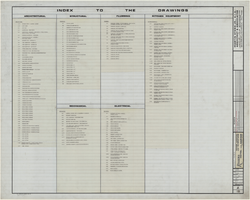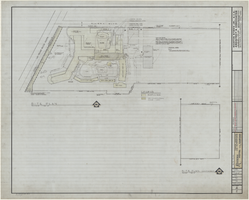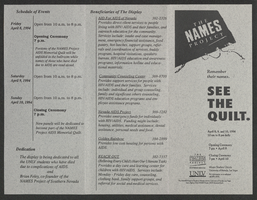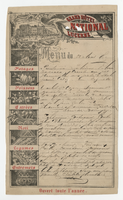Search the Special Collections and Archives Portal
Search Results



NAMES Project event program
Date
Archival Collection
Description
Text

Grand Hôtel National Lucerne, menu, August 22, 1887
Date
Archival Collection
Description
Text
Timothy Harney oral history interview
Identifier
Abstract
Oral history interview with Timothy Harney conducted by Sherrae Chesmore on February 26, 2006 for the Public School Principalship Oral History project. In his interview Harney discusses his experiences as public school teacher and principal in Southern Nevada. He also talks about what a typical day for a principal is like and what the expectation of teachers and principals are.
Archival Collection
Ray M. Cutright oral history interview
Identifier
Abstract
Oral history interview with Ray M. Cutright conducted by himself on April 22, 1981 for the UNLV University Libraries Oral History Collection. Cutright talks about his experiences in operating a boat that carried both tourist passengers and workers to and from the site of the Hoover Dam. He also discusses a few specific experiences, including what it was like navigating the river.
Archival Collection
Stuart Mason oral history interview
Identifier
Abstract
Oral history interview with Stuart Mason conducted by Claytee White on November 09, 2006 for the Boyer Early Las Vegas Oral History Project. Mason discusses his company, Taylor Construction, and gives an overview of the hotels the company has built and background information about them. He then describes moving to Las Vegas, Nevada to build Caesars Palace in 1964 and how the Civil Rights Movement impacted the construction scene. He then talks about old and new building projects, and the differences between being his own boss and working for someone else.
Archival Collection
Dr. Ed Goldman oral history interview
Identifier
Abstract
Oral history interview with Dr. Edward Goldman conducted by Barbara Tabach on March 22, 2016 and April 04, 2016 for the Southern Nevada Jewish Heritage Project. Goldman discusses his career as a Clark County School District teacher, negotiator, and regional superintendent over the span of thirty years. He also talks about his activity in the Las Vegas, Nevada Jewish community at Temple Beth Sholom and being a founding member of Midbar Kodesh Temple.
Archival Collection
L. J. Bowman oral history interview
Identifier
Abstract
Oral history interview with L. J. Bowman conducted by Lidia Sedano on October 11, 2004 for the Public School Principalship Oral History Project. In this interview, Bowman discusses his upbringing and path to becoming a teacher during the 1970s. He discusses his experience as a teacher in Wisconsin and in Montana, but highlights his 17 years as principal in various Montana school districts prior to becoming a teacher in the Clark County School District in the 1990s. He discusses his personal philosophy of education, and how it influenced his career as an administrator. He also discusses highlights and challenges of his career, and provides suggestions on what makes a successful principal.
Archival Collection
Claytee D. White oral history interview
Identifier
Abstract
Oral history interview with Claytee D. White conducted by Stefani Evans on November 2, 2023 for the African Americans in Las Vegas: a Collaborative Oral History Project. In this interview, Claytee D. White, founding directory of the Oral History Research Center at UNLV Libraries, celebrates the twentieth anniversary of the OHRC by contributing her oral history to the collection.
She begins by explaining how the system of sharecropping worked in her family near rural Ahoskie, North Carolina, and she talks about the field work involved in raising cotton, tobacco, corn, and peanuts. The fifth of eight children and the first daughter, she shares memories of going into town with her mother, of admiring her women teachers, and of attending North Carolina Central College (now University) for two years before moving to Washington, D.C., and working for the telephone company.
After recalling her two years in D.C. and 22 years in Los Angeles, California, she describes "running away" to Las Vegas, Nevada in the early 1990s. Here, at the History department at UNLV, she recalls learning to conduct oral histories. White shares memories of her first interviews with Hazel and Jimmy Gay and Lucille Bryant. She talks of matriculating to the College of William and Mary for her PhD and of returning to Bertie County to live with her mother and administer the office of The Shaw University Center for Alternative Programs in Education (CAPE). She describes how she was offered the position of OHRC founding director, why it matters that she was an "opportunity hire," and how it feels to be the only Black person in a room.
Archival Collection
